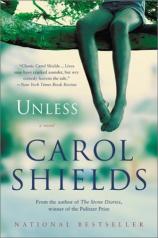Interview: May 10, 2002
May 10, 2002
Carol Shields, author of UNLESS, puts a woman's life under the microscope with thought-provoking frankness. In this interview with Bookreporter.com's Kathy Weissman she remarks on marriage, feminist outrage and her own unique approach to writing.
BRC: You've said in an interview that UNLESS "just came out." How do you think this spontaneity makes it different from your previous books?
CS: I've never believed in "inspiration" or the mystique of writing. But I suppose all these drugs we draw into our bodies and our altered sense of time must make us aware in a new way --- and give us a sense of permission.
BRC: Reta Winters, your protagonist, mentions how important work is in creating her characters --- and, clearly, this is important for you as well, in your fiction and in your life, whether it's cleaning the house or writing a novel. Can you elaborate?
CS: As an old lefty I believe in work as part of our human experience, a very big part. We need work, even if it is sometimes dangerous and demeaning. G. B. Shaw talks quite a bit about this need, and goes even further, insisting we need physical work, a little bit every day.
BRC: The title and chapter headings of this book are rather cryptic. Did you want to create a sense of mystery, disorientation, fragmentation for the reader that paralleled the shattering of Reta's own life?
CS: The last thing I would want would be to baffle the reader and throw her/him off course; that I regret. These little words, so often forgotten, connect the big nouns and verbs and give them a sense of time and place. In a funny way, I think I felt sorry for them, how under-appreciated they are.
BRC: Danielle Westerman, whose work Reta translates, is a powerful character. What or who was the inspiration?
CS: No one in particular. Perhaps the role model I always wanted. Danielle's life is lonely, but also brave.
BRC: There's a gratifying amount of feminist outrage in UNLESS as well as a very happy marriage. There's no logical reason that the two should be incompatible, but certainly their coexistence can create tension. Can you talk about the difficulty (or not) of reconciling them?
CS: I do love good men, and have had a number of them in my life. Men deserve novelistic space. And good marriages --- how rare are they --- can help us from blaming men. I do not believe that men wake up every morning and think: how can I oppress women today? They are as caught up as we are in our assigned roles --- but they have power and we don't.
BRC: There is a lot of specific detail in your novels --- the photographs in The Stone Diaries, the mazes in Larry's Party, the poems and documents in Swann, and the list of Reta's publications as well as her angry letters in this book. Can you comment on why you have made your created worlds so complete?
CS: I suppose we take most of our informational cues from small detail, an itchy ear, an ingrown toenail, an imagined slight which is only one or two words misplaced, a glimpse of a mother slapping a child, a soiled T-shirt.
BRC: You weren't published until the age of 40. Everything is so youth-oriented now, yet the books you've written in the last 25 years are rich and extraordinary. Can you explore what is valuable about a later start?
CS: I did publish two books of poetry in my thirties, and had a number of short stories broadcast on the CBC and BBC. I was busy raising children in my twenties and early thirties, and never dreamed I would ever have a novel published.
BRC: How is it different writing as a Canadian than as an American? One wonders if there is a greater freedom in writing about and in a country that isn't, as they say, a "superpower."
CS: For men writers here, there is not the haunting of the big cats: Hawthorne, Twain, Faulkner, Hemingway. We are somewhat on the edge in geographical terms, also in a literary sense --- we have almost no 19th century literature. And Canadian women are on the edge of the edge --- this has to give edge to voices --- at least I think so.
BRC: In UNLESS, you touch only once on breast cancer: Reta's letter about a short story in which a Czech professor living in L. A. is repelled by the sight of a mastectomy bra in a store window. Yet in a way the book is all about an unbearably painful event invading a woman's more or less tranquil and happy life; "like having a cold knife lodged in my chest," Reta says. Without in any way reducing your new novel to your illness, can you comment on the connection between them?
CS: I won't deny that my recent "ambush" by illness fed into the anguish that Reta is feeling at the loss of a child. I had to think hard about how I could transform my astonishment and grief, since I didn't want to write a breast cancer book. Other people have done that, and better than I could have done.
BRC: Which books have you read lately and liked?
CS: Geoffrey Wall's LIFE OF FLAUBERT. BLACK DOGS by Ian McEwan --- I think this is a masterpiece. MOTHERKIND by Sarah Hrdy (correct spelling, though it doesn't look like it).




